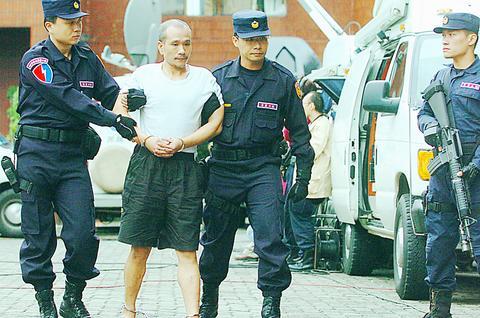Two of the nation's most wanted fugitives, Chen Yi-hua (陳益華) and Hsueh Chiu (薛球), were extradited from China yesterday, arriving in Taipei to stand trial after more than three years on the run, according to the Criminal Investigation Bureau.
"Chen and Hsueh's extradition represents the government's determination in fighting crime and protecting citizens' lives and property," said Minister of the Interior Su Jia-chyuan (

PHOTO: SEAN CHAO, TAIPEI TIMES
Su also made clear that cross-strait cooperation in the extradition of criminals was not based upon cash rewards. The Executive Yuan has in the past offered rewards for the capture of the nation's most wanted fugitives, and a reward of NT$10 million had been approved for the capture of the two fugitives. The minister, however, dodged the question of whether the Chinese police would be rewarded for their help in the arrest of Chen and Hsueh.
"The Chinese police authorities have not requested the reward, but according to regulations, we are obliged to reward an informant who aids in the capture of a fugitive. We will proceed in accordance with our regulations," Su said.
Su also took the opportunity to warn against attempting to avoid the long arm of Taiwanese justice by escaping to China.
"To the 326 fugitives who have yet to be arrested, cross-strait cooperation on crime will make it impossible to escape the forces of law by escaping to China," Su said.
Chen and Hsueh were captured and detained by Chinese police in July in Xiamen. The whereabouts of the two fugitives was revealed when they attempted to blackmail Yang Teng-kuei (楊登魁), owner of the GTV cable TV station, for NT$50 million while they were in Xiamen. According to authorities, Chen and Hsueh had taken refuge in China in November of last year.
The two returned to Taiwan in accordance with the Kinmen Agreement of 1990 that sets out guidelines for cross-strait extradition of criminals. They were transported by ship to the outlying island of Matsu before being flown to Taipei and arriving at the Criminal Investigation Bureau at 3:30pm yesterday afternoon.
Chen and Hsueh had been arrested by Miaoli police in March 21, 2000, but they were released the same day by the Miaoli District Court on bail of NT$300,000 and NT$200,000 respectively. They have been on the run since.The two built their notoriety on a string of high-profile kidnappings, including that of Taichung City Council Vice Speaker Chang Hung-nien (
In addition, the two are wanted on charges of armed robbery on several counts, including a raid of the military's Hsinchu financial office in January 2001, during which the two got away with NT$ 2.2 million.

MAKING WAVES: China’s maritime militia could become a nontraditional threat in war, clogging up shipping lanes to prevent US or Japanese intervention, a report said About 1,900 Chinese ships flying flags of convenience and fishing vessels that participated in China’s military exercises around Taiwan last month and in January have been listed for monitoring, Coast Guard Administration (CGA) Deputy Director-General Hsieh Ching-chin (謝慶欽) said yesterday. Following amendments to the Commercial Port Act (商港法) and the Law of Ships (船舶法) last month, the CGA can designate possible berthing areas or deny ports of call for vessels suspected of loitering around areas where undersea cables can be accessed, Oceans Affairs Council Minister Kuan Bi-ling (管碧玲) said. The list of suspected ships, originally 300, had risen to about 1,900 as

Right-wing political scientist Laura Fernandez on Sunday won Costa Rica’s presidential election by a landslide, after promising to crack down on rising violence linked to the cocaine trade. Fernandez’s nearest rival, economist Alvaro Ramos, conceded defeat as results showed the ruling party far exceeding the threshold of 40 percent needed to avoid a runoff. With 94 percent of polling stations counted, the political heir of outgoing Costa Rican President Rodrigo Chaves had captured 48.3 percent of the vote compared with Ramos’ 33.4 percent, the Supreme Electoral Tribunal said. As soon as the first results were announced, members of Fernandez’s Sovereign People’s Party

MORE RESPONSIBILITY: Draftees would be expected to fight alongside professional soldiers, likely requiring the transformation of some training brigades into combat units The armed forces are to start incorporating new conscripts into combined arms brigades this year to enhance combat readiness, the Executive Yuan’s latest policy report said. The new policy would affect Taiwanese men entering the military for their compulsory service, which was extended to one year under reforms by then-president Tsai Ing-wen (蔡英文) in 2022. The conscripts would be trained to operate machine guns, uncrewed aerial vehicles, anti-tank guided missile launchers and Stinger air defense systems, the report said, adding that the basic training would be lengthened to eight weeks. After basic training, conscripts would be sorted into infantry battalions that would take

GROWING AMBITIONS: The scale and tempo of the operations show that the Strait has become the core theater for China to expand its security interests, the report said Chinese military aircraft incursions around Taiwan have surged nearly 15-fold over the past five years, according to a report released yesterday by the Democratic Progressive Party’s (DPP) Department of China Affairs. Sorties in the Taiwan Strait were previously irregular, totaling 380 in 2020, but have since evolved into routine operations, the report showed. “This demonstrates that the Taiwan Strait has become both the starting point and testing ground for Beijing’s expansionist ambitions,” it said. Driven by military expansionism, China is systematically pursuing actions aimed at altering the regional “status quo,” the department said, adding that Taiwan represents the most critical link in China’s